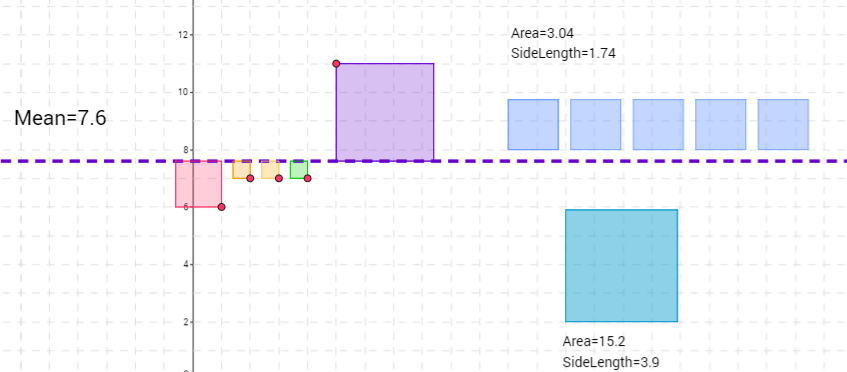 This sketch actually has been rattling in my head for a while and it took several versions to get to this state. But it is for kids to practice translating points. There are three stages, the first just let's students drag points to match the translation (which is probably even good for grade 6 students), then they have to type in the coordinates for the translations. Those two then will generate an infinite number of translations for students to do. The last sketch is an open sketch where students can create their own problem and solve it. The intent is that I will eventually have a series of sketches covering rotations, reflections and transformations. You can get both the websketch (which doesn't need any special software) or the original GSP sketch.
This sketch actually has been rattling in my head for a while and it took several versions to get to this state. But it is for kids to practice translating points. There are three stages, the first just let's students drag points to match the translation (which is probably even good for grade 6 students), then they have to type in the coordinates for the translations. Those two then will generate an infinite number of translations for students to do. The last sketch is an open sketch where students can create their own problem and solve it. The intent is that I will eventually have a series of sketches covering rotations, reflections and transformations. You can get both the websketch (which doesn't need any special software) or the original GSP sketch.Curriculum Tags: Gr7, Gr8
http://engaging-math.blogspot.ca/p/web-sketches.html
 Any time you can trick kids into doing math problems by hiding a "worksheet", I think it's a good thing. And if you have someone who builds an activity and shares it out, even better. Here @theShaunCarter has created a game to help students practice finding the zeros of quadratics. The downloads are there so you can create your own set of cards. Note that depending on what course you are taking, you might have to pitch some cards. I like the fact that the game encourages factoring by having the game be: giving an x value and students checking if their expression equals zero (so having a factored expression is most efficient). And as an added bonus, he generated this cool tool to generate the x value they have to use.
Any time you can trick kids into doing math problems by hiding a "worksheet", I think it's a good thing. And if you have someone who builds an activity and shares it out, even better. Here @theShaunCarter has created a game to help students practice finding the zeros of quadratics. The downloads are there so you can create your own set of cards. Note that depending on what course you are taking, you might have to pitch some cards. I like the fact that the game encourages factoring by having the game be: giving an x value and students checking if their expression equals zero (so having a factored expression is most efficient). And as an added bonus, he generated this cool tool to generate the x value they have to use.Curriculum Tags: MPM2D, MFM2P, MCR3U, MCF3M, MBF3C
https://blog.primefactorisation.com/2016/09/22/zero/
 I like when you can take a statistical concept that often students only (usually) ever see as abstract and make it visual. Here @samjshah uses Geogebra to visualize the effects of changing data on the sum of the squares and the standard deviation of a small data set. Nicely done.
I like when you can take a statistical concept that often students only (usually) ever see as abstract and make it visual. Here @samjshah uses Geogebra to visualize the effects of changing data on the sum of the squares and the standard deviation of a small data set. Nicely done.Curriculum Tags: MDM4U, MAP4C
https://samjshah.com/2016/09/25/visualizing-standard-deviation/
Here's a comparison of North American teaching styles versus Japanese styles. The premiss is that in Japan they have much better success by focussing on problem solving while we focus on just getting answers and memorizing algorithms. I tend to agree with this notion. I think it's a good read but it reminded me of this video from Phil Daro (which I know I have shared more than once here.
Curriculum Tags: All
http://www.japantimes.co.jp/opinion/2016/10/17/commentary/world-commentary/japanese-students-excel-mathematics/#.WArJ_dxyeY4
https://vimeo.com/79916037
Phil Daro - Against "Answer-Getting" from SERP MEDIA on Vimeo.
This could be a totally fun thing to do with just about any group of kids (provided you have enough pencils.
Curriculum Tags: All
https://www.youtube.com/watch?v=DelH1S32dOg
I'm not sure how I missed this during the Olympics but I love this representation of every medal winner of the 100m in the modern olympics. Super for linear scatter plots. Check the site out for more cool visualizations of this data.
Curriculum Tags: MPM1D, MFM1P, MDM4U, MAP4C
http://www.nytimes.com/interactive/2016/08/15/sports/olympics/usain-bolt-and-120-years-of-sprinting-history.html?_r=0
Here is a great way to incorporate poetry into your math class. How about a Fibonacci poem.
Curriculum Tags: All
https://twitter.com/debecca/status/785955621677989888
I have no idea who wrote this, but it's excellent. Maths <3 pic.twitter.com/Uw3XkP7Xtm— The Joy of Bex (@debecca) October 11, 2016







No comments:
Post a Comment